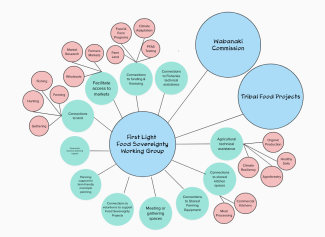What is now Maine has supported a system of Wabanaki hunting, fishing, and gathering grounds through time immemorial. Before European colonization, these grounds were accessible by the Wabanaki for their seasonal hunting, fishing, and gathering of traditional and culturally important foods and medicines.
Currently, most of the land is held privately by individuals and companies, by land trusts and non-profit organizations, and by state and local governments. This ownership of the land, as well as the institution of regulations for hunting, fishing, and gathering, has resulted in limiting the access for the Wabanaki and has led to a loss of access to traditional foods.
All Wabanaki Nations are sovereign and have an inherent right to feed their people in ways that they determine support the health, wellbeing and traditions of their community.
As part of the First Light Learning Journey, we are part of a group that is committed to supporting Wabanaki Food Sovereignty through these statements:
- We heard from Indigenous leaders that food sovereignty is of paramount importance; we share the commitment to this issue and honor it.
- We are active listeners and are ready to support when asked, and know that this support needs to follow Wabanaki leadership.
- We’re prepared to co-create with Wabanaki communities when that is desired. We want to both listen and contribute, lending our experience and resources to helping address Wabanaki food sovereignty challenges in step with our Wabanaki colleagues.
- We are committed to transformational change toward food system justice which centers Wabanaki Food Sovereignty, but we do not wish to prescribe the path toward that change.
- We are not seeking to perpetuate current systems that don’t work, though we can offer resources and opportunities from our current reality while simultaneously envisioning, designing, and implementing a better future together.
- We are organizing ourselves as a group of farming, fishing and food system community members with the goal of bringing our power and privilege to bear to build the prosperity of Wabanaki people without burdening our Indigenous colleagues with additional demands.
- We believe that food is a human right, and that we’re facing a climate crisis and instability in our communities that demands a transformative and just response. We believe that all people must benefit from food system resiliency centered on Wabanaki leadership and food sovereignty, based in millennia of Indigeneous knowledge and sustainable land stewardship.
- We recognize that Wabanaki people have been displaced from ancestral lands, foods, and medicines, and oppressed by white settler colonialism, and we as a group are committed to participating in undoing that injustice.
- We believe that doing this work is necessary to be whole, and it comes from a place of great joy and a belief in possibility and reciprocity.

Food Sovereignty Working Group connections and assets to commit to this work.
-
Sarah Alexander
she/her
Maine Organic Farmers and Gardeners Association
Catalyst for Food Sovereignty Working Group
Sarah is the facilitator and therefore the catalyst for the Food Sovereingty Working Group.